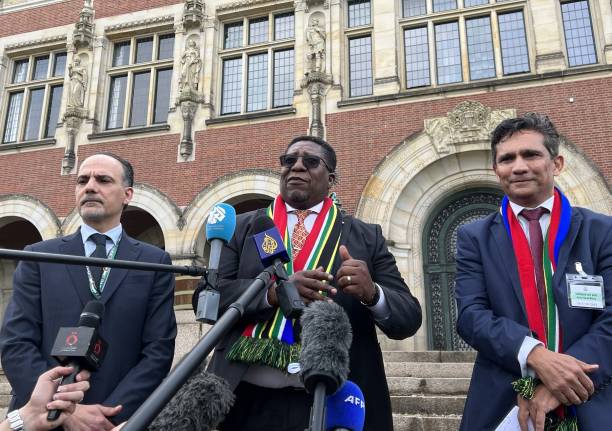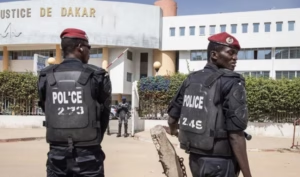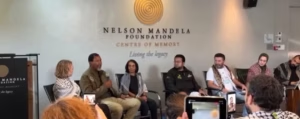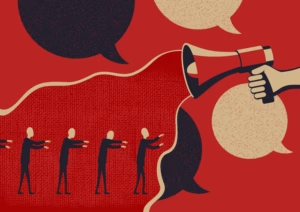Israel is reportedly engaging members of the U.S. Congress in an effort to influence South Africa’s legal proceedings against it in the International Court of Justice (ICJ) according to Axios. This comes as the country faces accusations related to its actions during the war in Gaza. The Israeli foreign ministry has reportedly issued a cable outlining its strategy to push South Africa to halt its case.
South Africa has until October 28 to present its case to the ICJ, which involves claims that Israel violated the Genocide Convention of 1948 during the Gaza conflict. The court is being asked to assess whether Israel’s military actions in Gaza amount to a breach of international law.
“We are asking you to immediately work with lawmakers on the federal and state level, with governors and Jewish organizations to put pressure on South Africa to change its policy towards Israel and to make clear that continuing their current actions like supporting Hamas and pushing anti-Israeli moves in international courts will come with a heavy price,” the cable stated, revealing Israel’s diplomatic campaign to halt the legal action.
South Africa initiated the legal proceedings at the ICJ in December 2023, accusing Israel of violating the Genocide Convention. The core of South Africa’s argument is that Israel’s military activities in Gaza aim to destroy a significant portion of the Palestinian population. Israel has firmly denied these allegations.
The ICJ has conducted several hearings, and in May 2024, it issued a provisional order, requesting that Israel cease its military operations in Rafah, a city in southern Gaza. However, the court has yet to engage in substantial discussions concerning South Africa’s accusations of genocide. This process is expected to unfold in the coming months.
In response to South Africa’s legal challenge, Israel has reportedly launched a diplomatic effort, focusing on garnering support from U.S. lawmakers to pressure South Africa. The Israeli foreign ministry’s cable, sent to Israeli diplomatic missions across the U.S., urged representatives to take swift action. According to the cable, Israeli diplomats were instructed to work closely with U.S. lawmakers, Jewish organizations, and other influential groups to press South Africa to reconsider its stance on the Gaza war.
Israeli officials are also keen to see public statements from U.S. politicians condemning South Africa’s legal actions. Diplomats were instructed to stress the potential consequences for South Africa, including possible impacts on its trade relations with the U.S. However, this outcome is considered unlikely given Washington’s interest in maintaining its ties with South Africa to counterbalance the influence of Russia and China.
Israel’s strategy involves not only rallying support from lawmakers but also making its diplomatic efforts as visible as possible within the U.S. press and on social media. One of the tactics Israeli diplomats are pursuing is lobbying for state and federal legislation against South Africa. These legislative moves are viewed as significant even if they do not materialize, as their mere presentation would highlight South Africa’s growing isolation on this issue.
Israeli diplomats are also seeking to organize hearings in U.S. state legislatures that focus on South Africa’s policies towards Israel. The aim is to generate a broader discussion on the matter, and ultimately, to pressure South Africa into altering its stance on the ongoing legal action.
The U.S. Congress has become a central tool in Israel’s diplomatic push. Israeli diplomats are requesting that American lawmakers reach out directly to South African diplomats and make it clear that continuing the case at the ICJ could come at a cost for South Africa. This approach, according to the cable, is intended to change South Africa’s policies, particularly in light of the recent shift in the country’s political landscape.
In June 2024, South Africa formed an unprecedented multiparty coalition government following the ruling African National Congress (ANC) party’s loss of its 30-year parliamentary majority. Israel sees this political shift as an opportunity for South Africa to adopt a new approach in its relations with Israel.
The Israeli cable highlighted the importance of encouraging South Africa’s new coalition government to explore diplomatic dialogue with Israel, rather than pursuing punitive actions. Israeli diplomats were directed to emphasize this opportunity for change, urging South Africa to pursue negotiations instead of “boycotts and punishments.”
While Israel’s diplomatic efforts are becoming more public, both the Israeli foreign ministry and the South African embassy in Washington, DC have declined to comment on the developments. The lack of official responses adds an air of uncertainty to how the situation will unfold.
The case brought by South Africa at the ICJ is a pivotal moment in the broader Israel-Palestine conflict, bringing international law and diplomacy into the spotlight. The fact that Israel is focusing its diplomatic efforts on the U.S. underscores the global stakes of this legal battle.
For now, Israel’s strategy relies on exerting pressure through U.S. lawmakers and leveraging public diplomacy in an attempt to avert the legal action from moving forward. The coming months will be crucial in determining whether this diplomatic pressure will be enough to shift South Africa’s stance, or if the case will proceed as planned at the ICJ.

















